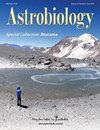Confidence of Life Detection: The Problem of Unconceived Alternatives.
IF 3.5
3区 物理与天体物理
Q2 ASTRONOMY & ASTROPHYSICS
引用次数: 1
Abstract
Potential biosignatures that offer the promise of extraterrestrial life (past or present) are to be expected in the coming years and decades, whether from within our own solar system, from an exoplanet atmosphere, or otherwise. With each such potential biosignature, the degree of our uncertainty will be the first question asked. Have we really identified extraterrestrial life? How sure are we? This paper considers the problem of unconceived alternative explanations. We stress that articulating our uncertainty requires an assessment of the extent to which we have explored the relevant possibility space. It is argued that, for most conceivable potential biosignatures, we currently have not explored the relevant possibility space very thoroughly at all. Not only does this severely limit the circumstances in which we could reasonably be confident in our detection of extraterrestrial life, it also poses a significant challenge to any attempt to quantify our degree of uncertainty. The discussion leads us to the following recommendation: when it comes specifically to an extraterrestrial life-detection claim, the astrobiology community should follow the uncertainty assessment approach adopted by the Intergovernmental Panel on Climate Change (IPCC).生命探测的信心:意外选择的问题。
在未来的几年和几十年里,有望提供外星生命(过去或现在)的潜在生物特征,无论是来自我们自己的太阳系内,还是来自系外行星的大气层,还是其他地方。对于每一个潜在的生物特征,我们的不确定程度将是第一个问题。我们真的发现了外星生命吗?我们有多确定?本文考虑了未考虑的替代解释问题。我们强调,阐明我们的不确定性需要评估我们探索相关可能性空间的程度。有人认为,对于大多数可能的潜在生物特征,我们目前还没有非常彻底地探索相关的可能性空间。这不仅严重限制了我们对探测到地外生命有合理信心的环境,而且对任何量化我们不确定程度的尝试都构成了重大挑战。讨论让我们得出以下建议:当涉及到外星生命探测的声明时,天体生物学界应该遵循政府间气候变化专门委员会(IPCC)采用的不确定性评估方法。
本文章由计算机程序翻译,如有差异,请以英文原文为准。
求助全文
约1分钟内获得全文
求助全文
来源期刊

Astrobiology
生物-地球科学综合
CiteScore
7.70
自引率
11.90%
发文量
100
审稿时长
3 months
期刊介绍:
Astrobiology is the most-cited peer-reviewed journal dedicated to the understanding of life''s origin, evolution, and distribution in the universe, with a focus on new findings and discoveries from interplanetary exploration and laboratory research.
Astrobiology coverage includes: Astrophysics; Astropaleontology; Astroplanets; Bioastronomy; Cosmochemistry; Ecogenomics; Exobiology; Extremophiles; Geomicrobiology; Gravitational biology; Life detection technology; Meteoritics; Planetary geoscience; Planetary protection; Prebiotic chemistry; Space exploration technology; Terraforming
 求助内容:
求助内容: 应助结果提醒方式:
应助结果提醒方式:


